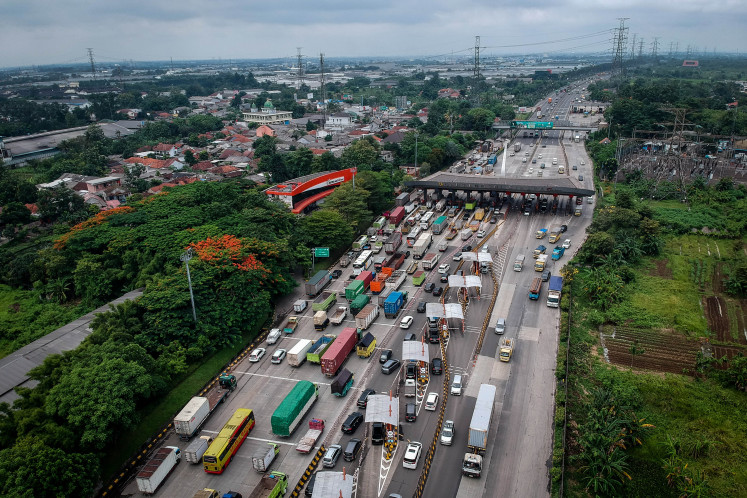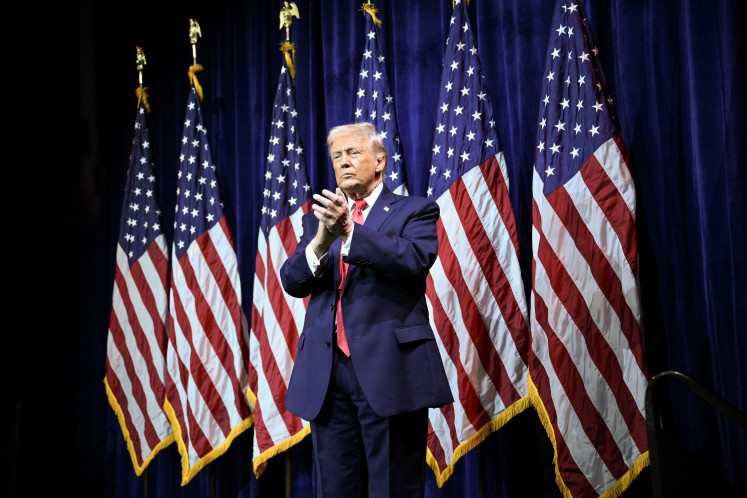Popular Reads
Top Results
Can't find what you're looking for?
View all search resultsPopular Reads
Top Results
Can't find what you're looking for?
View all search resultsIndonesia can afford the coronavirus battle, but...
The government must provide support to these businesses, workers and their families battered by economic disruption from the COVID-19 coronavirus outbreak. But can we afford it?
Change text size
Gift Premium Articles
to Anyone
 Coronavirus effect: A worker operates a sewing machine at the Binong Jati Sewing Center in Bandung, West Java, on March 6. The Indonesian Textile Association says the COVID-19 coronavirus has affected the textile and textile products industry as the supply of raw materials has been disrupted and the shipment of spare parts from China for machinery used by the garment industry has been suspended temporarily. (Antara/Raisan Al Farisi)
Coronavirus effect: A worker operates a sewing machine at the Binong Jati Sewing Center in Bandung, West Java, on March 6. The Indonesian Textile Association says the COVID-19 coronavirus has affected the textile and textile products industry as the supply of raw materials has been disrupted and the shipment of spare parts from China for machinery used by the garment industry has been suspended temporarily. (Antara/Raisan Al Farisi)
A
lot of businesses and the families they feed around the world are at risk from the economic impact of the novel coronavirus outbreak. Concerns over travel and mobility have hit tourism-related businesses hard, also paralyzing factories and offices in some countries.
In Indonesia, flights, hotels, restaurants and their supporting businesses in tourist destinations have been battered by a slump in Chinese tourists, which are the second-biggest group after Malaysians and spend around US$2.8 billion per year on travel. China, where the virus was first detected, is also Indonesia’s largest trading partner and the country’s second-largest investor.
With most activities in Chinese cities still limited, and with the virus spreading around the world, businesses are expecting a disruption to the supply chain. From automotive components and textile fabric to machine parts and electronics, the supply of imported goods has already been disrupted. Some investment projects have also been halted.
The government must provide support to these businesses, workers and their families battered by economic disruption from the COVID-19 coronavirus outbreak. But can we afford it?
With a relatively low debt level, Indonesia has more options to borrow than other highly leveraged countries around the world in order to fund a cushion for any potential virus-driven economic shocks.
At 30.2 percent of the gross domestic product (GDP), Indonesia’s debt level is lower than the internationally accepted norm of 60 percent and certainly one of the lowest in the world. For comparison, the debt-to-GDP ratio is 238 percent in Japan, 107 percent in the United States, and more than 50 percent in China, Malaysia and Vietnam respectively.
Indonesia never exceeded its self-imposed fiscal deficit cap of 3 percent of the GDP; the rate was 2.2 percent in 2019. Indonesia’s budget discipline and fiscal management have been lauded by many countries. However, this deficit cap can limit the scope of Indonesia’s fiscal capabilities to provide a cushion for potential economic shocks.
Read also: Lower income, rising debt expected as Indonesia unveils extra stimulus
There are certainly also more risks of a state revenue shortfall, as corporations and individuals are likely to hold off spending this year amid concerns over the virus. Businesses are also increasingly asking for tax breaks to cope with the shocks, and state income from commodities is likely to drop because of lower prices.
On the receiving end, new sources of state revenue remain small relative to the potential shortfall.
Apart from extra income from lowering taxable imported goods to $3 per shipment starting Jan. 30, state lenders are paying out higher dividends to the government. A new source of state revenue is also expected to come from the plastics excise that has been approved by the House of Representatives. The digital economy tax will also come into effect once the omnibus bill on taxation is passed by the House.
Meanwhile, there is a need to disburse funds from the state budget at lightning speed. The government last week unveiled Rp 10.3 trillion ($723.1 million) worth of fiscal stimulus for subsidies on staple goods and mortgages for low-income earners, among other measures, such as tax breaks for hotels and restaurants in severely hit tourist destinations. A second stimulus package is underway.
Read also: IMF, World Bank say ready to address economic challenges of coronavirus
Prior to the announcement, Finance Minister Sri Mulyani Indrawati announced plans to front-load social spending, such as the Family Hope Program (PKH), village funds and school operational funds, not to mention increasing subsidies on staple goods and mortgages. Front-loading means disbursing the funds earlier than scheduled.
These measures to cushion the bottom 30 percent is a step in the right direction, but with potential risks on the downside in terms of state income, we should use our fiscal privileges wisely, having a relatively underleveraged state budget.
During the announcement of the first fiscal stimulus package, some of the spending allocations raised eyebrows, such as Rp 72 billion for social media “influencers” to promote tourist destinations and Rp 298.5 billion incentives for airlines and travel agents to attract foreign tourists to Indonesia.
At a time when virus containment was a top priority elsewhere, Indonesia may be an outlier in encouraging tourism instead. And when possibly millions of workers and their families suffer from a loss of income as demand for many goods drops and raw material supplies are disrupted, they should enjoy the benefits rather than the influencers.
Even if these incentives are aimed at reinvigorating small and medium businesses at tourist destinations shocked by fewer tourists, why was the goal to attract tourists instead of temporarily supporting the livelihoods of the people and businesses who suffer most?
Should we not focus on public health at the moment? After all, healthy people equal a healthy economy. If the budget funds were instead funneled into strong prevention and curing the sick, that could do more for an economic recovery than encouraging tourism and exposing society to further risk of infection without a strong healthcare system in place.
Read also: Indonesia pressured to do more to detect coronavirus amid zero reported cases
Targeted spending and policies are crucial to the effectiveness of using taxpayers’ money in the battle against adverse economic effects of the coronavirus. As economic theorists teach us, it is allowable for spending and debt levels to increase for productive use.
Helping hospitals test and treat patients and improving the infrastructure for prevention could be examples. Supporting workers in virus-battered industries need to be prioritized because as always, at times of economic shocks, the most vulnerable group of society will suffer the greatest losses.
Apart from managing macroeconomic stability, fiscal policies need to aid efforts to ensure public health and help low-income groups cope with losses from the coronavirus outbreak. Every rupiah counts.
***
Deputy managing editor of The Jakarta Post









